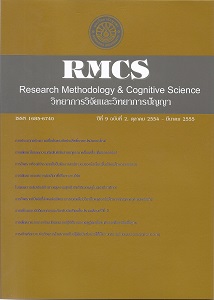การวิเคราะห์ปัจจัยที่ส่งผลต่อพัฒนาการเจตคติต่อวิชาชีพครู ของนักศึกษาหลักสูตรครุศาสตรบัณฑิต โดยใช้โมเดลโค้งพัฒนาการเหลื่อมเวลาระยะยาวที่มีตัวแปรแฝง
Main Article Content
Abstract
การวิจัยนี้มีวัตถุประสงค์เพื่อพัฒนาและตรวจสอบโมเดลโค้งพัฒนาการเหลื่อมเวลาระยะยาวที่มีตัวแปรแฝงเจตคติต่อวิชาชีพครู พัฒนาการเจตคติต่อวิชาชีพครูและวิเคราะห์ ปัจจัยที่ส่งผลต่อพัฒนาการเจตคติ ต่อวิชาชีพครูกลุ่มตัวอย่างเป็นนักศึกษาหลักสูตรครุศาสตร์บัณฑิต (หลักสูตร 5 ปี) ที่เข้าศึกษาในสถาบันผลิตครูในปีการศึกษา 2548, 2549, 2550 และ 2551 สาขาวิชาการศึกษาปฐมวัย คณิตศาสตร์และ ภาษาอังกฤษ จากการสุ่มตัวอย่างแบบหลายขั้นตอนจํานวนรวมทั้งสิ้น 1,876 คน จากมหาวิทยาลัยบูรพา มหาวิทยาลัยราชภัฏเชียงราย มหาวิทยาลัยราชภัฏกาญจนบุรีและมหาวิทยาลัยราชภัฏนครราชสีมา จําแนกเป็น 4 กลุ่มตามชั้นปีที่เก็บข้อมูลครั้งแรกคือ ชั้นปีที่ 1 ถึง 4 จานวน 590, 453, 396 และ 437 คน ตามลำดับ แต่ละกลุ่มมีการเก็บรวบรวมข้อมูลจำนวน 4 ครั้ง ห่างกันประมาณครั้งละ 5 เดือน เครื่องมือ ที่ใช้เป็นแบบสอบถามเจตคติต่อวิชาชีพครูที่ผู้วิจัยพัฒนาขึ้น และการวิเคราะห์ข้อมูลเป็นการประมาณค่าพัฒนาการเจตคติต่อวิชาชีพครู ด้วยการวิเคราะห์โมเดลโค้งพัฒนาการเหลื่อมเวลาระยะยาวที่มีตัวแปรแฝงและวิเคราะห์ ปัจจัยที่ส่งผลต่อเจตคติ ต่อวิชาชีพครูด้วยการวิเคราะห์ ถดถอยพหุคูณ
ผลการวิจัยสรุปได้ดังนี้ 1) โมเดลโค้งพัฒนาการเหลื่อมเวลาระยะยาวที่มีตัวแปรแฝงเจตคติต่อวิชาชีพครูที่พัฒนาขึ้นสอดคล้อง กลมกลืนกับข้อมูลเชิงประจักษ์โดยมีรูปแบบพัฒนาการแบบไม่ใช่เส้นตรง 2) เจตคติต่อวิชาชีพครูมีค่าเฉลี่ยสถานะตั้งต้นในการวัดครั้งแรก เท่ากับ 3.87 และมีอัตราพัฒนาการเพิ่มขึ้นตลอดช่วงเวลาการศึกษาตามหลักสูตรจากภาคเรียนที่ 1 ถึงภาคเรียนที่ 10 ด้วยอัตราพัฒนาการ เฉลี่ย 0.08 และ 3) ปัจจัยสำคัญที่สุดที่ส่งผลต่อพัฒนาการเจตคติต่อวิชาชีพครูคือความสมพันธ์ ระหว่างอาจารย์กับนักศึกษาและความสัมพันธ์ ระหว่างนักศึกษากับเพื่อน รองลงมาคือ ความตั้งใจประกอบอาชีพครูคะแนนเฉลี่ยสะสม และสาขาวิชา
An Analysis of Factors Affecting the Growth of Attitude Toward Teaching Profession of Undergraduate Education Program Students Using the Sequential Latent Growth Curve Model
Somkiat Tanok
Faculty of Education, Nakhon Rachasima Rajabhat University, Thailand
The purposes of this research were 1) to develop and validate the sequential latent growth curve model of attitude toward teaching profession, 2) to study growth of attitude toward teaching profession of undergraduate education program students, and 3) to determine the effect of hypothesized covariates on growth of attitude toward teaching profession. The sample consisted of 1,876 undergraduate students from 4 class cohort (590, 453, 396, and 437) of 4 universities in Thailand, namely, Burapha University; Kanchanaburi Rajabhat University; Cheingrai Rajabhat University; and Nakhon Ratchasima Rajabhat University, each cohort obtained for 4 point in time with 5 month interval. The research instrument was attitude toward teaching profession inventory which developed by researcher. Data were analyzed in order to estimate growth parameter using the sequential latent growth curve model and employed multiple regression analysis to analyze the covariate factors affecting on growth of attitude toward teaching profession.
The research results were as follows: 1) The growth of attitude toward teaching profession using the sequential latent growth curve model was fi tted with empirical data and indicated that nonlinearity in the growth curve; 2) The mean intercept and slope were 3.87 and 0.08, respectively, indicated that on average, student had initial attitude toward teaching profession status of 3.87 and steady increase in growth rate of 0.08 over time; and 3) The substantial covariate factor effecting on growth of attitude toward teaching profession were relationship between teachers and students, relationship between students and peer, students desire to be teacher, cumulative grade point average, and program major.

